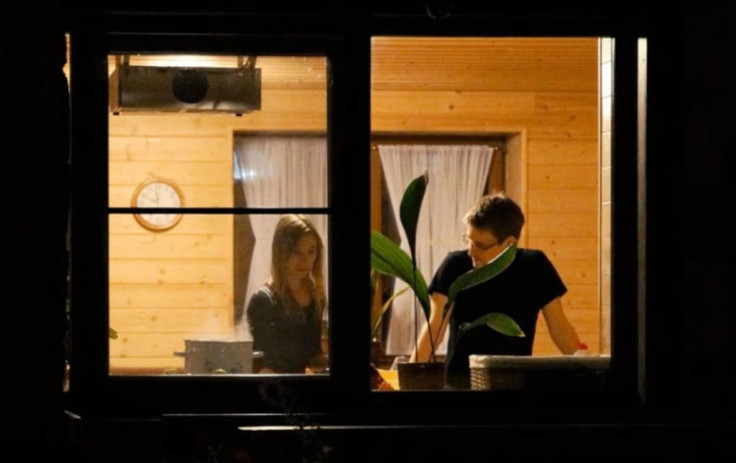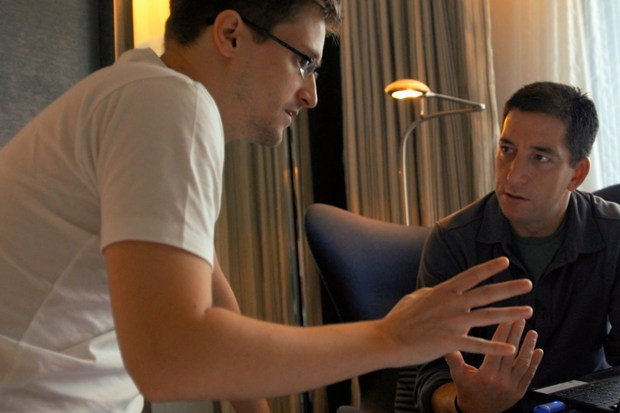Citizenfour Review: The Inside Story of Real-Life Spy Edward Snowden

One of the first things that Edward Snowden said to journalist Glenn Greenwald upon meeting him in a now infamous Hong Kong hotel room in June 2013, was that he did not want the story to be about him.
Snowden said he wanted it to be about everybody - about the massive infringement on civil liberties that the stolen government files in his possession were about to reveal, and about creating a public discourse around the revelations.
By now everybody knows, at least to some extent, the level of mass surveillance carried out by the US National Security Agency (NSA), the UK's Government Communications Headquarters (GCHQ), and other associated government agencies.
But other than the odd event appearance via video chat, no one really knows anything about the man behind the leaks. What led to the single biggest classified information leak in history? How did Snowden contact the journalists involved? What became of his former life? What exactly went on in that Hong Kong hotel room?
These are the questions that filmmaker Laura Poitras sets out to answer in Citizenfour.
Watch list
Poitras did not choose the subject of her film - the subject chose her. The documentary forms the final part of a film trilogy examining post 9/11 America and follows 2006's My Country My Country which is about life under US occupation in Iraq, and 2010's The Oath which is about the notorious Guantanamo Bay prison camp.
The first two films in the series earned Poitras a place on the Department of Homeland Security's Watch List and were what first caught the attention of Snowden.
Citizenfour begins with Poitras being contacted by Snowden through an encrypted email under the alias "citizen four". The exchange that follows reveals both Snowden's political beliefs and also his courage in coming forward - to speak out against a system that he felt was no longer based on the principles of the elected and the electorate, but of the ruler and the ruled.
When the pair finally meet in Hong Kong, by now with Greenwald in tow, Poitras turns on her camera. What unfolds transpires to be one of the most important slices of 21st century history.

Bear witness
The eight days that Snowden spends holed up in that hotel room sees Greenwald, and later his Guardian colleague Ewan MacAskill, trying to untangle the vast amounts of classified files and documents Snowden had taken with him from his NSA workstation in Hawaii. The audience bears witness to the decisions about what to leak and when, the logistics of storing the files, and whether to unmask the whistle-blower.
More tense than any spy thriller I've ever seen, the implications of each action and decision on the part of Snowden and the journalists are both real and immediate.
Early on, just as Snowden is warning Greenwald that his password he has just used to access the files may not be secure enough, a fire alarm rings out throughout the hotel. Snowden and Greenwald sit silently, looking nervously from each other to the camera. Have they been rumbled before the first file has even leaked? "That's strange," Snowden says. In turns out to be just a test, but the tension remains. The stakes are enormous.
As the disclosures finally break through media channels spearheaded by the Guardian, Snowden himself remains remarkably calm. The cramped walls of the hotel suite contain the eye of the storm. With his face on the front page of every major newspaper in the world, and with reports blaring from the TV in his room, Poitras films Snowden as he uses gel to spike up his hair in an effort to hide his identity.
One last glance
It is an absurd situation that at one stage involves him experimenting with a bright green umbrella to see if it would hide his face from the world's press, who are by now rapidly closing in on his hideout. Eventually, after eight days, Snowden leaves the hotel room with one last glance back at the camera.
The final third of the film flits through the aftermath, jumping from scenes of new revelations, senate hearings, Greenwald's partner being detained at Heathrow, and hard drives containing the leaked documents being manually destroyed in the basement of the Guardian.
There are still alot of unanswered questions, such as how and why did Snowden's long-term partner return and how were other friends and family members affected by his decision to drop the biggest single leak of classified files in history.
One of the final scenes gives a voyeuristic view through a kitchen window of Snowden cooking with his partner Lindsay Mills. Beyond the scene itself, no further explanation is given. With these questions, much like Snowden's actions and the debate between privacy and security that has consequently arisen, it is left up to the viewer to make up their own minds.
© Copyright IBTimes 2025. All rights reserved.






















